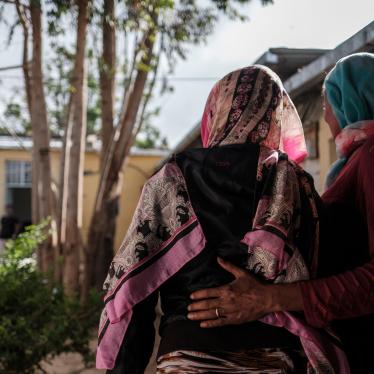Eight years ago, I walked into the Nairobi office of the Centre for Rights Education and Awareness expecting a mildly helpful discussion of my project on women's property rights in Kenya. Ann Njogu, CREAW's Chairperson, was clearly a very busy and serious lawyer.
Within minutes, I knew that she was also a passionate, forceful advocate. She wasted no time in picking up the phone to hook me up with women to interview, deluging me with legal information, and guiding me on strategy.
That first day in Ann's office, she told me harrowing stories of clients she had represented in divorce, inheritance, domestic violence, rape, and other matters. CREAW had a legal clinic to represent poor women and a psychological counseling service, and regularly held workshops to inform women of their rights.
The next day, I got to see Ann in action at a community workshop. It was in a simple, tin-roof-and-cinderblock church in a slum. Several hundred women were packed in the church listening with rapt attention as Ann and her team explained that the practices of denying women inheritance, and sometimes even of forcing widows to marry their brothers-in-law in order to keep their property, violated their human rights.
Ann and the CREAW team instructed the women on how they and their husbands could write simple wills, and enforce them. They explained that women are entitled to keep family property upon divorce. A troupe of actors did a wild theatrical depiction of a woman being disinherited and fighting for her rights. It thrilled yet served its purpose in education.
The women attending the workshop cheered, asked questions, and shared their stories. They left seeming empowered to take a stand for their rights. Many asked Ann to take their cases.
Over the next few years, I saw Ann's efforts to promote human rights explode in new directions. She has been at the forefront of campaigns for a new constitution. Her organization, not being content with welfare services, pursued social solutions that tackled the root causes of violence and discrimination. CREAW spearheaded work in taboo areas like sexuality, bride price, widow inheritance, and women's political participation.
When violence erupted after Kenya's flawed 2007 general election, leaving over a thousand people dead and hundreds of thousands displaced, Ann and her team sprung into action. Alongside other civil society advocates, Ann condemned the government for failing to hold anyone accountable. Her organization documented the sexual and gender-based violence experienced by women in the post-election violence. That documentation assisted a commission that investigated the violence, and is now being used by the International Criminal Court.
One of Ann's goals is a changed constitution - one that guarantees equal rights for everyone, regardless of gender, class or ethnicity. She believes the free-flow of information is essential for this to happen.
Therefore, with help from donors, Ann's organization has set up a radio station, Safari Africa. She hopes it will be one of 210 community-based radio stations - one for each of Kenya's constituencies. By helping Kenyans generate their own media and discuss topics important to them, Ann hopes to encourage peoples' participation in governance. Providing people with information, Ann believes, is necessary to help people shake off oppression, and help them make strong decisions for themselves, their communities, and Kenya.
Ann's team is also taking on other controversial issues through the radio venture. In a single day recently, the station's website covered issues that stir passionate debates in East Africa, such as the rights of homosexuals, government corruption, judicial failure, and police abuse of sex workers.
All her activism comes with a price. Ann has been arrested and brutally beaten at peaceful protests, sexually assaulted by the police, and threatened by politicians. Staff members at her organization are constantly concerned about her -- and their -- security. At every step, Ann knows she is at risk. She has to wonder, every single day, whether her two children might also be at risk. Threats against her family are subtle, but sinister nonetheless.
And every day, Ann summons her courage and strength. She simply will not stop speaking out against injustice, and fighting for the right of all Kenyans to live in a fair, peaceful, prosperous society. Those who would silence Ann might as well give up. It will never work.
In March, the US State Department honored Ann with the 2010 International Women of Courage Award. With this award the US government pays tribute to outstanding women leaders worldwide, recognizing the courage they've shown as they struggle for social justice and human rights. In over a decade as a women's rights activist, I've never met anyone who deserves this award more than Ann Njogu.
When I spoke to Ann about the International Women of Courage award, she instantly changed the subject from herself to all Kenyans. While honored, she sees it as an award for the many Kenyan women and men who pay a high price for demanding respect for their human rights. She hopes it will serve as an encouragement to all human rights defenders, in this generation and the next, working for a better Kenya.


